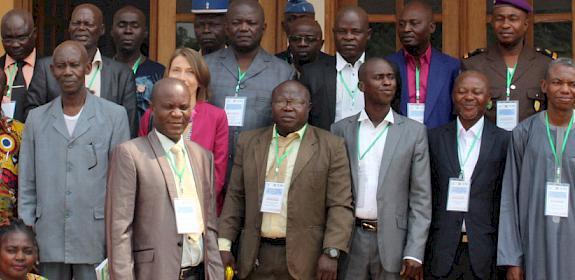Wildlife trade on the agenda at key Africa-China meeting
Beijing, China, 17th July 2012—Government representatives from across Africa meet their counterparts in China this week in what TRAFFIC regards as a vital opportunity to ensure the rising trade in wildlife products between Africa and China is both legal and sustainable.
China is Africa’s largest trading partner, with overall trade values estimated to be more than a trillion Chinese Yuan (USD 160 billion) per annum. The rising influence of China within the African continent creates multiple opportunities for growth in trade between key African countries and China, including within the wildlife trade sector—the trade of wild fauna and flora products, including timber and fisheries.
According to Dr Jianbin Shi, Head of TRAFFIC’s Programme in China “Sustainable utilization of Africa’s wildlife resources can lead to positive development and growth for trading partners, while unsustainable wildlife trade depletes Africa of its natural wealth, and illegal trade inevitably leads to a growth in organized criminal activities, with the potential to create political instability.”
This week’s 5th Ministerial Conference of Forum on China-Africa Co-operation (FOCAC) provides an opportunity for countries to transform the wildlife trade dynamics from Africa to China, leading to a significant reduction in illegal trade and supporting the sustainable trade in Africa’s wild plants and animals, says TRAFFIC.
These positive outcomes can be achieved through enhancing governance along the entire trade chain for wildlife commodities, from source to end user through providing targeted financial support from China to African nations, TRAFFIC believes.
Following each of the four earlier FOCAC Africa-China Ministerial conferences, significant financial investment has been pledged to support agriculture and rural development in Africa, including investments in development of forestry and fisheries.
Although the rapid growth in Chinese investment and aid in Africa has largely been welcomed, there are concerns over the levels of unregulated trade in natural resources, including those involving timber and fisheries, while poaching of Africa’s elephants is running at records levels.
Problems in Africa are largely due to inadequate law enforcement capacity and training; inadequate laws and/or policies; insufficient resource management capacity; a lack of efficient co-operation at national and sub-regional levels between agencies (particularly enforcement and Customs officers); and lack of collaboration between exporting, transit countries and their counterparts in China.
TRAFFIC considers it is essential to involve all the players along the wildlife trade chain, including the private sector, to ensure their operations are in compliance with international Conventions such as CITES (the Convention on International Trade in Endangered Species of Wild Fauna and Flora) and the CBD (Convention on Biological Diversity), and with national environmental and social laws and regulations in China and Africa.
Specific support to encourage sustainable trade and eliminate illegal trade should become a key element of China’s aid policy in Africa.
Companies, factories, processing plants, shipping companies, timber importing companies and other stakeholders must be transparent and held accountable to and responsible for operating in a legal, sustainable and verifiable manner.
Greater resources are needed for monitoring and enforcement measures, such as cargo inspection. Currently less than 2% of cargo traffic from Africa is inspected, enabling criminals to conceal the true origin, ownership and content of container cargo.
Other measures TRAFFIC recommends include implementation of existing environmental standards, such as timber legality measures such as the Global Forest & Trade Network (GFTN), developed through TRAFFIC’s collaborations with WWF, and the FairWild Standard for harvesting of wild medicinal and aromatic plants.
Chinese nationals based in African countries need to made aware of environmental laws and policies, while TRAFFIC urges the Chinese government to develop and implement well researched demand reduction campaigns to influence consumer behaviour, with a view to reducing demand for products of illegal origin.
Such measures will need adequate resourcing, and TRAFFIC encourages China to provide targeted financial support to such initiatives.
“There has never been a greater urgency for China and African governments to put into action their commitments towards environmental sustainability and to direct significant resources towards addressing rising concerns over the levels of illegal and unsustainable trade in wildlife resources,” said David Newton, Head of TRAFFIC’s programme in East /Southern Africa.
Notes:
1. Founded in 1976, TRAFFIC, the wildlife trade monitoring network, is a non-governmental organization who works to ensure that trade in wild plants and animals is not a threat to the conservation of nature.
2. In terms of overall wildlife trade, the major sub-Saharan African nations trading with China are Cameroon, the Republic of the Congo, Equatorial Guinea, Gabon, Madagascar, Mozambique, South Africa and Tanzania, while Mauritius, Namibia, the Seychelles, South Africa and Tanzania are amongst the leading exporters of fisheries’ commodities from Africa to China. Further, Ethiopia has significant exports of medicinal & aromatic plants to China.
3. “Wildlife trade” is considered to be the offer, sale, or exchange of any animal or plant resource originating from the wild, whether by legal or illegal means. The trade covers a diverse range of goods, ranging from timber, medicinal, fish and other animal or plant food products, tourist curios and skins, also live animals and plants.



